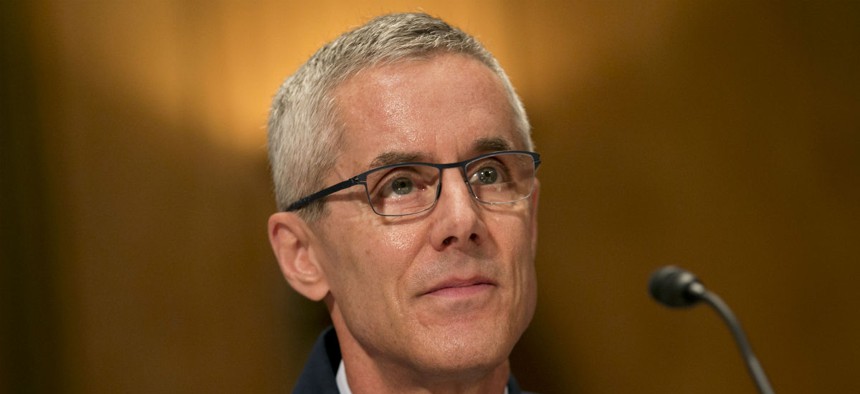
TSA administrator Peter Neffenger testifies at a confirmation hearing in June 2015. Jacquelyn Martin/AP
TSA Chief Promises More Staffing, Better Accountability
Committee members grill administrator, but suggest he’s moving in the right direction.
Lawmakers praised the relatively new head of the Transportation Security Administration for cleaning up the troubled agency, but said that after less than one year on the job, he still has a long way to go to fix it.
The House Oversight and Government Reform Committee held its second hearing on TSA mismanagement in recent weeks, with employees telling the panel in April the agency was “in crisis.” Most of the committee members Thursday expressed some optimism the agency was trending in the right direction since Peter Neffenger was sworn in as administrator last year, but they still highlighted a high attrition rate, unchecked bonuses, whistleblower retaliation and substandard screening as issues TSA needed to address.
Neffenger said he was holding senior leadership accountable for improving airport security after TSA -- under his predecessor’s leadership -- displayed major failures in detecting illegal objects and preventing airports and airlines from hiring individuals potentially linked to terrorism. The administrator told the committee he has sat down with all of his top officials to tell them what he expected of them.
“If you fail to perform, I will hold you accountable,” Neffenger recalled telling the officials.
Part of the issue, he said, is understaffing. TSA employs 6,000 fewer screeners than it did several years ago, but Neffenger said he has stopped the bleeding. While TSA has recently suffered from attrition problems -- in 2014, 4,644 TSA employees left the agency, while just 373 joined -- the chief said he is staffing the agency back up to handle peak travel times.
Neffenger also said he has ended the practice of forced relocations, which whistleblowers have accused the previous TSA administration of using to retaliate against those shedding a light on misconduct. The administrator encouraged employees to “voice their views through a variety of available tools and services.” He also said bonuses at the agency have decreased and are now more strictly tied to performance.
While lawmakers blamed TSA’s problems on poor management, they floated potential legislative fixes. Committee Chairman Jason Chaffetz, R-Utah, said Congress may have to bring employees under Title V with most other federal employees, noting it requires more oversight of large bonuses.
Others were even less optimistic TSA could be saved; Rep. John Mica, R-Fla., voiced his frustration that three individuals who visited him missed their flights Wednesday night because airport screeners did not have the “courtesy” to let them skip the line. He said the agency was beyond hope.
“Your attempts on the training and recruiting and all of that will be a failure,” Mica said. “You cannot train, you cannot recruit, you cannot administrate. It’s just a huge, failing government program. And it will fail.”
Rep. Gerry Connolly, D-Va., said some of the workforce issues at TSA stemmed from the nature of the job.
“Very few people are going to make a career out of telling people to take off their belts and shoes,” Connolly said, “and yet it’s critical to the mission.”
Rep. Elijah Cummings, the committee’s ranking member, sought to bring optimism to TSA’s trajectory, quoting a letter from an agency employee saying Neffenger “inspired all of us to renew our faith in TSA leadership.” Cummings added TSA was going through the normal process of having its issues identified and working to address them.
“This is the way it’s supposed to work,” he said.
NEXT STORY: A Legal Victory Against Obamacare







